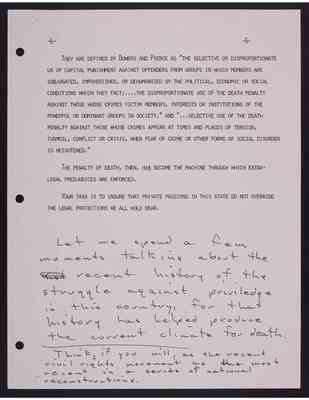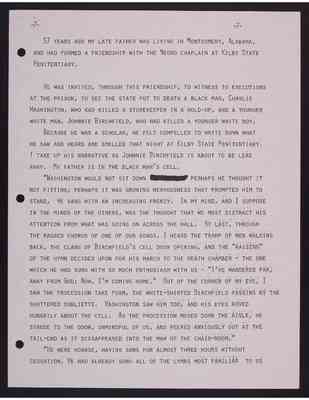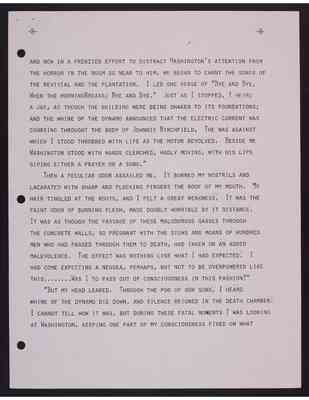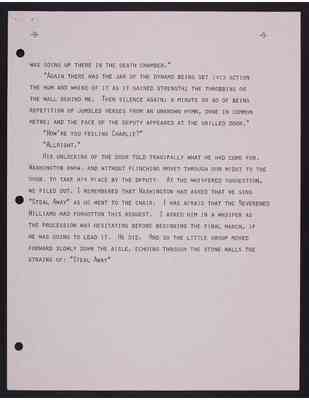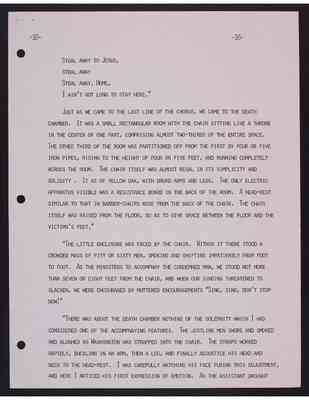Pages
6
-6-
They are defined by Bowers and Pierce as "the selective or disproportionate us of capital punishment against offenders from groups in which members are subjugated, impoverished, or dehumanized by the political, economic or social conditions which they fact;....The disproportionate use of the death penalty against those whose crimes victim members, interests or institutions of the powerful or dominant groups in society," and "...selective use of the death penalty against those whose crimes appear at times and places of tension, turmoil, conflict or crisis, when fear of crime or other forms of social disorder is heightened."
The penalty of death, then, has become the machine through which extra-legal prejudices are enforced.
Your task is to ensure that private passions in this state do not override the legal protections we all hold dear.
Let me spend a few moments talking about the hist recent history of the struggle against priviledge in this country, for that history has helped produce the current climate for death.
Think, if you will, as the recent civil rights movement as the most recent in a series of natural reconstructions.
7
-7-
57 years ago my late father was living in Montgomery, Alabama, and had formed a friendship with the Negro chaplain at Kilby State Penitentiary.
He was invited, through this friendship, to witness executions at the prison, to see the state put to death a black man, Charlie Washington, who had killed a storekeeper in a hold-up, and a younger white man, Johnnie Birchfield, who had killed a younger white boy. Because he was a scholar, he felt compelled to write down what he saw and heard and smelled that night at Kilby State Penitentiary. I take up his narrative as Johnnie Birchfield is about to be lead away. My father is in the black man's cell. "Washington would not sit down he writes perhaps he thought it not fitting; perhaps it was growing nervousness that prompted him to stand, We sang with an increasing frenzy. In my mind, and I suppose in the minds of others, was the thought that we must distract his attention from what was going on across the hall. At last, through the ragged chorus of one of our songs, I heard the tramp of men walking back, the clang of Birchfield's cell door opening, and the "raising" of the hymn decided upon for his march to the death chamber - the one which he had sung with so much enthusiasm with us - "I've wandered far, away from God; now, I'm coming home." Out of the corner of my eye, I saw the procession take form, the white-shirted Birchfield passing by the shuttered oubliette. Washington saw him too, and his eyes roved hungrily about the cell. As the procession moved down the aisle, he strode to the door, unmindful of us, and peered anxiously out at the tail-end as it dissappeared into the maw of the chair-room." "We were hoarse, having sung for almost three houjrs without cessation. We had already sung all of the hymns most familiar to us
8
-8-
And now in a frenzied effort to distract Washington's attention from the horror in the room so near to him, we began to chant the songs of the revival and the plantation. I led one verse of "Bye and Bye, When the Morning Breaks; Bye and Bye." Just as I stopped , I heard a jar, as thought the building were being shaken to its foundations; and the whine of the dynamo announced that the electric current was coursing through the body of Johnnie Birchfield, The was against which I stood throbbed with life as the motor revolved. Beside me Washington stood with hands clenched, hadly moving, with his lips giving either a prayer or a song."
Then a peculiar odor asailed me. It burned my nostrils and lacarated with sharp and plucking fingers the roof of my mouth. My hair tingled at the roots, and I felt a great weakness. It was the faint odor of burning flesh, made doubly horrible by it distance. It was as though the passage of these malodoroous gasses through the concrete walls, so pregnant with the sighs and moans of hundred men who had passed through them to death, had taken on an added malevolence. The effect was nothing like what I had expected. I had come expecting nausea, perhaps, but not to be overpowered like this ........ Was I to pass out of consciousness in this fashion?"
"But my head leared. Through the fog of our song, I heard whine of the dynamo die down, and silence reigned in the death chamber. I cannot tell how it was, but during these fatal moments I was looking at Washington, keeping one part of my consciousness fixed on what
9
-9-
was going up there in the death chamber."
"Again there was the jar of the dynamo being set into action the hum and whine of it as it gained strength; the throbbing of the wall behind me. Then silence again; a minute or so of being repetition of jumbled verses from an unknown hymn, done in common metre; and the face of the deputy appeared at the grilled door."
"How're you feeling Charlie?" "Allright."
His unlocking of the door told tragically what he had come for. Washington knew, and without flinching moved through our midst to the door. To take his place by the deputy. At the whispered suggestion, we filed out. I remembered that Washington had asked that we sing "Steal Away" as he went to the chair. I was afraid that the Reverend Williams had forgotten his request. I asked him in a whisper as the procession was hesitating before beginning the final march, if he was going to lead it. He did. And so the little group moved forward slowly down the aisle, echoing through the stone walls the strains of: "Steal Away"
10
-10-
Steal away to Jesus, steal away Steal away, Home, I ain't got long to stay here."
Just as we came to the last line of the chorus, we came to the death chamber. It was a small rectangular room with the chair sitting like a throne in the center of one part, comprising almost two-thirds of the entire space. The other third of the room was partitioned off from the first by four or five iron pipes, rising to the height of four or five feet, and running completely across the room. The chair itself was almost regal in its simplicity and solidity. It as of yellow oak, with broad arms and legs. The only electric apparatus visible was a resistance board in the back of the room. A head-rest similar to that in barber-chairs rose from the back of the chair. The chair itself was raised from the floor, so as to give space between the floor and the victim's feet."
"The little enclosure was faced by the chair. Within it there stood a crowded mass of fifty or sixty men, smoking and shifting impatiently from foot to foot. As the ministers to accompany the condemned man, we stood not more than seven or eight feet from the chair, and when our singing threatened to slacken, we were encouraged by muttered encouragements "Sing, sing, don't stop now!'"
"There was about the death chamber nothing of the solemnity which I had considered one of the accompanying features. The jostling men swore and smoked and alughed as Washington was strapped into the chair. The straps worked rapidly, buckling in an arm, then a leg, and finally adjustice his head and neck to the head-rest. I was carefully watching his face furing this adjustment, and here I noticed his first expression of emotion. As the assistant brought
